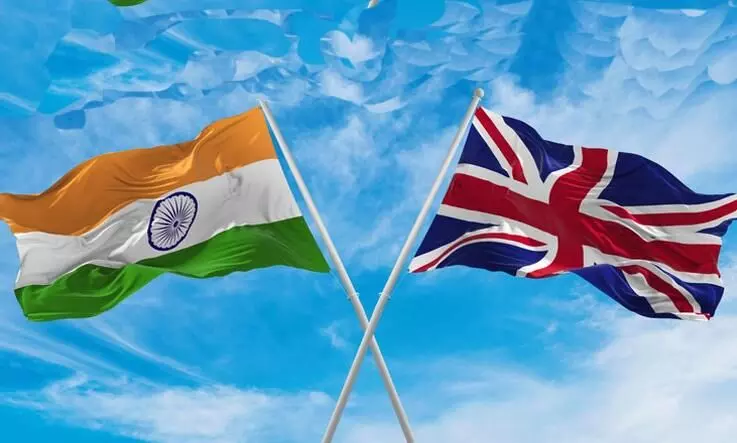
India shouldn’t agree to free cross-border data flows under FTA with UK: GTRI
text_fieldsNew Delhi: India should not agree to free cross-border data flows under the proposed free trade agreement with the UK as ownership of national data is crucial for developing public services, think tank GTRI said on Tuesday.
It added that India should never agree to binding commitments in these areas as it will lock the country's policy space in the future.
The Global Trade Research Initiative (GTRI) said this FTA marks a transformative shift in India's approach to trade, moving its focus from the East to the West, and broadening its scope to include non-trade matters such as environment, labour, gender, digital trade, and data governance.
The talks between the two countries for the agreement are at an advanced stage and both sides are expected to announce the conclusion of talks by the end of this month.
Subjects like labour standards, gender, environment, and digital trade have been included in the FTA on the UK's request and India should make domestic rules/standards before taking commitments in the agreement on these matters, the think-tank said in its paper.
 Also Read:Flipkart claims 1.4 bn customer visits during ‘The Big Billion Days’ festive sales
Also Read:Flipkart claims 1.4 bn customer visits during ‘The Big Billion Days’ festive sales
It also said that India should not agree to stop preferential treatment to domestic suppliers in the government procurement chapter of the trade pact as allowing the UK companies to sell goods and services to the government here would bring British firms at par with domestic entities.
On the other hand, Indian firms face “a very” competitive and restricted government procurement market in the UK with little business prospects and due to this, India needs be conservative and careful, it added.
“India should not agree to free cross-border data flows. Ownership of national data is crucial for developing public services. India should never agree to binding commitments as it will lock in the future,” GTRI Co-Founder Ajay Srivastava said.
The negotiations span 26 subjects, each with its unique implications. These include merchandise trade, services, rules of origin, government procurement, labour standards, gender issues, environmental concerns, intellectual property rights (IPRs), and investments, each with its set of challenges and opportunities.
 Also Read:Ferrari enters crypto space, accepts bitcoin, ether, and USDC for luxury car payments
Also Read:Ferrari enters crypto space, accepts bitcoin, ether, and USDC for luxury car payments
The other subjects include sanitary and phytosanitary measures, technical barriers to trade, competition, trade facilitation, customs cooperation, small and medium-sized enterprises, trade and sustainable development, digital trade, and dispute settlement.
“The sustainability aspect of the FTA, notably its potential impact on India's garment industry, holds particular significance, as it could lead to non-tariff barriers aimed at promoting sustainability,” it said adding India must also consider the potential introduction of a Carbon Border Adjustment Mechanism (CBAM) by the UK and address this in the FTA provisions.
The UK has launched a consultation on carbon border adjustment mechanisms as it intends to introduce emissions reporting in 2025 and a phased implementation of the CBAM in 2026, it said.
Once CBAM is launched, the GTRI said, the UK products will continue to enter India at zero duties but Indian products may pay 20-35 per cent customs duty equivalent to CBAM charges.
“In this multifaceted negotiation process, India faces the need to strike a balance between its economic interests and the preservation of domestic standards and objectives, as this FTA could significantly impact its trade landscape,” Srivastava said.
Further, on Rules of Origin, it said these rules ensure that products from third countries do not receive FTA benefits until they undergo significant transformation in the exporting country.
 Also Read:Vizhinjam Port to attract world's largest ships, transform India's maritime trade
Also Read:Vizhinjam Port to attract world's largest ships, transform India's maritime trade
For example, an orange grown in the US can not be exported from the UK to India by availing duty concessions of the trade pact, but juice extracted from the same orange in the UK can be, if rules of origin permit.
The GTRI said India prefers more conservative Rules of Origin compared to most developed countries, leading to extended consultations and negotiations.
“India may consider being more flexible in its Rules of Origin framework, especially as Indian firms in sectors like chemicals, electronics, and synthetic textiles are increasingly using imported inputs,” it added.
On labour standards, it said India should not agree to reiterate the ILO (International Labour Organisation) conventions agreed as commitments at ILO are the best endeavour, but reiterating those under an FTA becomes binding and actionable.
“This logic applies to environment, sustainability and other chapters also,” Srivastava said adding “a text about the participation of women and MSMEs may be a disguise for obtaining concessions in government procurement or services and India must avoid taking onerous obligations on non-trade issues”.
The UK was the 15th largest trading partner of India in 2022-23 with exports of goods worth USD 11.4 billion and imports USD 9 billion. In 2021-22, the UK was India's 17th largest trading partner.
With inputs from PTI
 Also Read:Pak, China to sign highway deals under CPEC during Kakar's Beijing visit
Also Read:Pak, China to sign highway deals under CPEC during Kakar's Beijing visit






















